Six Square Aims to Provide Brighter Future For Austin’s Black Residents
By Madelyn Gee
Reporting Texas
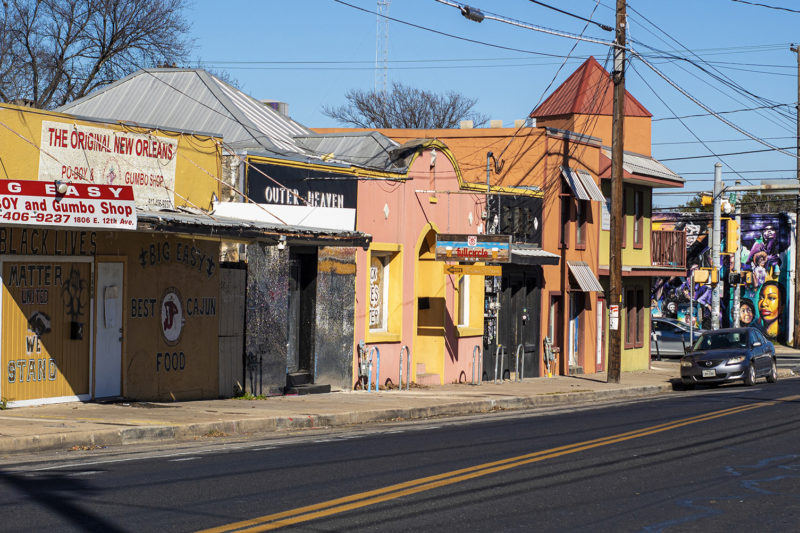
Businesses line 12th Street, one of the areas served by Six Square, the nonprofit whose mission is to celebrate and preserve the Black community in East Austin. Divina Ceniceros/Reporting Texas
Austin’s Black population is dwindling, and formerly Black neighborhoods are gentrifying rapidly. Some residents worry about losing connection to African-American history and culture. Six Square aims to protect that connection.
The nonprofit organization started in 2013 as part of the Austin City Council’s African American Quality of Life Initiative. Its mission is to celebrate and preserve the legacy of Central East Austin’s Black community “through cultural arts, education, economic development, and historic preservation,” according to Six Square’s website. To that end, Six Square offers historical tours and musical events, has funded murals in East Austin and has worked to preserve historical sites.
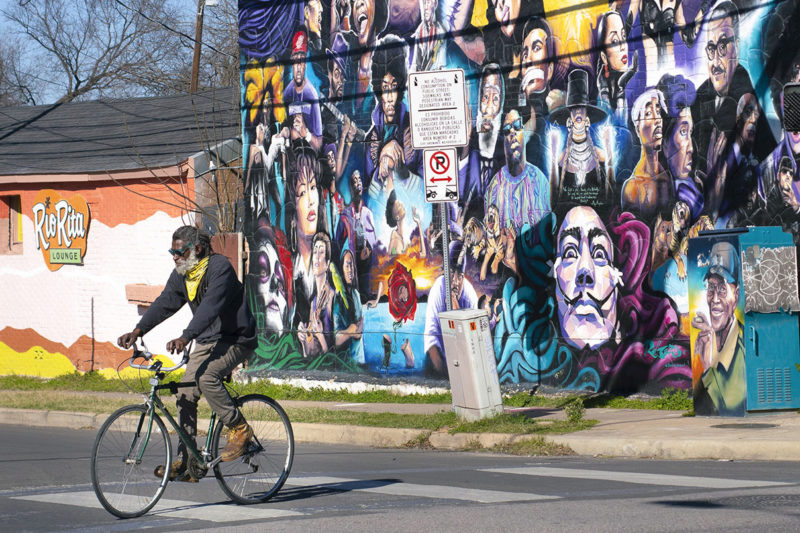
A man rides past a mural at East Austin’s 12th and Chicon Streets on February Feb. 6, 2021. Painted by artist Chris Rogers, the mural had to be repainted in 2017 after a new business owner painted it white. Activists from Six Square and other community organizations lobbied the business owner to recommission the artist to paint a new mural in the space. Divina Ceniceros/Reporting Texas
The organization receives funding from the city — $250,000 in the fiscal year 2019-2020 — and also hosts fundraisers.
Before the pandemic, Six Square offered space for local art exhibitions. Even in a supposedly progressive city, Black artists sometimes have trouble booking at exhibition spaces, Lauren Lluveras, program coordinator at Six Square, said.
The organization would invite people to watch an interview with the artist as well as provide a space to showcase and earn money for their art, Lluveras said.
“When the moment comes that people stop being as energized as affirming Black life as they are right now, our focus will still be on Black people,” she said.
Along with creating opportunities for Black creatives to be paid, since the pandemic Six Square has also distributed dozens of COVID-19 relief grants of at least $1,200 per award and is planning more distributions, Lluveras said. In 2020, the organization was able to give $55,000 to 37 Black businesses, creatives and entrepreneurs economically affected by COVID-19, she added.
Six Square partners with organizations, establishments and Black creatives across the city, including Antone’s Nightclub, Forklift Danceworks — a dance collective that creates dance pieces with non-traditional dancers such as sanitation workers and warehouse employees — and Black History Bike Ride.
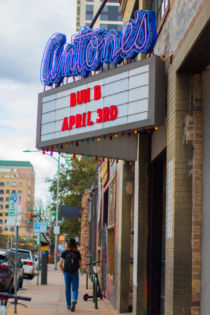
Antone’s Nightclub, which now partners with Six Square, has been amplifying Black voices and artists since 1975. Divina Ceniceros/Reporting Texas
Black History Bike Ride is a part of Six Square’s Incubator Program. Six Square provided “knowledge and expertise” on getting his project set up as a non-profit, Talib Abdullahi, founder of Black History Bike Ride, said.
The organization offers bike tours of spots that highlight Black culture, including the University of Texas’s Martin Luther King Jr. statue, the George Washington Carver Library and the Haskell House, a landmark representing the former slaves who created the Clarksville neighborhood.
Mallory Ferro, venue manager at Antone’s Nightclub, is working with Six Square to amplify Black voices, art, and culture at the renowned club by giving artists space to share their craft, Ferro said.
“We tend to find that in Austin our audience is a lot of white people. It can be a tough spot to make sure that that is not just the consumption of Black culture and rather incorporating it, teaching it and getting white people to open their eyes, ears, hearts, minds and learn,” Ferro said.
Six Square gets its name from the six square miles of East Austin where Black residents were forced to move in the early part of the 20th century. The 1928 city plan located municipal services for black citizens east of what is today I-35 and concentrated the minority population there.
“The city said if you are Black and you live in Austin and you want to continue to get access to water, electricity and sewage removal, then you need to move east,” Lluveras said.
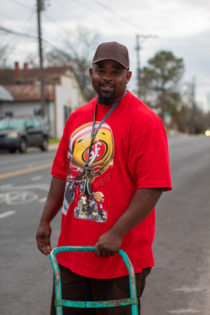
Sedrick McCarther, who has lived in East Austin his entire life, says that as the area has gentrified, Black and Hispanic residents have been pushed out. Divina Ceniceros/Reporting Texas
In 2019, Six Square started funding Funmi Ogunro, producer and editor of the video production services company Art is Cool, to make films focusing on Austin’s Black legacy and future. Art is Cool’s first show in 2018 explored the Black female voice in film.
“Since then, I have always asked them if they want to be a sponsor, and they always say yes,” Ogunro said.
Six Square is helping Art is Cool raise money for a documentary focusing on Austin’s Black freedom communities, Ogunro added. These communities were built by formerly enslaved African Americans after the Civil War ended in 1865.
Six Square has also provided funding to Austin artist Adrian Armstrong.
“We are currently featuring an exhibit of [Armstrong’s] at our Idea Lab Gallery,” Kendyll Gross, the education coordinator at the University of Texas at Austin’s Art Galleries at Black Studies, said.
“It is exciting to see that these Black organizations are working in tandem with artists to give them the recognition that they deserve and a platform,” Gross said.
The Rev. Griff Martin, senior pastor at the First Baptist Church of Austin, said the death of George Floyd under the knee of a white police officer in Minneapolis in May motivated his congregation to get involved with Six Square.
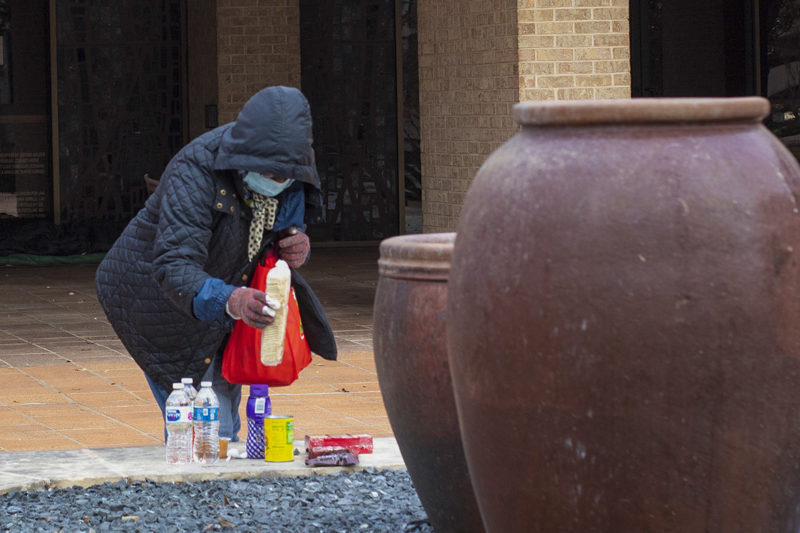
A woman picks up items from a food pantry outside the First Baptist Church of Austin on March 9, 2021. The church has gotten more involved with Six Square and provides nonperishables and bottled water to help residents battling food insecurity. Divina Ceniceros/Reporting Texas
“We worked with Six Square and said ‘We have these eight rooms. What would it be like if you all helped us find six to eight artists who we could work with and they could have this space for 18 to 24 months?’ After that, if they are a painter, let them do a gallery show for us here. If they are a spoken word artist, let them perform in worship. How can we let them have the space to be creative and then help introduce them to an audience that maybe might be harder to reach because the racial divide in Austin is just so horrible,” Martin said.
Six Square has become a leader in strengthening community connections and improving the economic landscape for Black Austinites, Lluveras said.
“Our center has been and will continue to be Black people. We have put on programming that pays Black people and appeals to Black people,” she added. “Our bottom line is that we do this work for Black folks.”